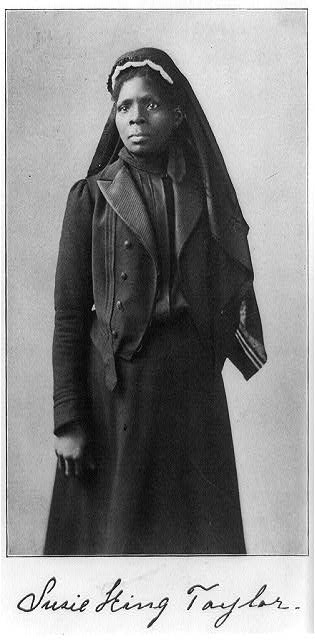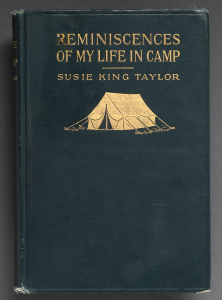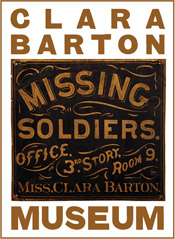Visible Woman: Susie King Taylor’s Civil War Memoir
Museum members support scholarship like this.
Memoirs and accounts from Civil War women offer fascinating insights into an understudied, gendered layer of the era’s history. As I began to study gendered aspects of the Civil War, I noticed an alarming lack of intersectionality in my resources. My reading list consisted only of white authors. Considering the war’s inextricable connection with race and slavery, I was missing an essential dimension. What were the experiences of black women?

Circa 1902, Courtesy East Carolina University
Thus, I found Susie King Taylor. Taylor is one of the only African American woman memoirists from the Civil War. Her book, Reminiscences of My Life in Camp, chronicles her role as a laundress, cook, and nurse for the 33rd United States Colored Troops, known also as the 1st South Carolina Volunteers.
Born into slavery, Taylor’s childhood memories offer a look at the everyday reality of slavery: a life where walking through the streets with a pass was simply normal, where church hymns painted scenes of freedom and talk of “the Yankees” inspired hope. Despite being legally barred from learning to read and write, literacy played an important role in Taylor’s life. As a child, Taylor was taught to read and write by a friend of her grandmother’s: “We went every day about nine o’clock, with our books wrapped in paper to prevent the police or white persons from seeing them.”
The American Civil War finally reached Taylor outside Savannah, Georgia, when federal troops took the Fort Pulaski. The war had come to her: “I remember what a roar and din the guns made. They jarred the earth for miles.”
After the fort was in Federal hands, Taylor’s uncle took her, along with several other family members, to live briefly under Union protection at St. Catherine’s Island, then to St. Simon’s Island, where she finally, to her joy, saw the Federal troops she had heard so much about. She recorded her meeting with one Union soldier who “was surprised at my accomplishments (for they were such in those days), for he said he did not know there were any negroes in the South able to read or write.”
Taylor’s memoir provides insight into the experiences of United States Colored Troops (USCT) and offers a valuable new perspective on gender and race relations. For instance, African American troops did not receive pay for the first eighteen months of their service. Taylor explained that “their wives were obliged to support themselves and children by washing for the officers of the gunboats and the soldiers, and making cakes and pies which they sold to the boys in camp.”
“I assisted in cleaning the guns and used to fire them off, to see if the cartridges were dry, before cleaning and reloading, each day,” writes Taylor of her own experiences with the 33rd USCT, “I thought this great fun. I was also able to take a gun all apart, and put it together again.” This freedom and responsibility offers a stark juxtaposition to Taylor’s earlier life in bondage. She also writes of the respect she was given by the soldiers of the 33rd and that which she gave them in return.
In Taylor’s memoir, she includes the experiences members of the 33rd USCT, as well as her own. She writes of injury and death and the sensations of battle.

A 1902 edition of Taylor’s memoir
Courtesy East Carolina University
Near the end of the memoir is a section titled “Thoughts on Present Conditions,” Taylor meditates on race relations after the war. She writes, “I wonder if our white fellow men realize the true sense or meaning of brotherhood?…In this ‘land of the free’ we are burned, tortured, and denied a fair trial, murdered for any imaginary wrong conceived in the brain of the negro-hating white man.” In these musings is the essence and the necessity of Taylor’s work. While other female memoirists offer unforeseen insight into the world of gender and the war, they cannot capture the intersectional reality of being both an African American and a woman in the South during the war. Taylor captures the hope of freedom, the horror of destruction, and the reality of racist institutions that would continue to plague the country.
Taylor’s post-war reflections pose difficult questions that demand a reflective pause. Her insight into the everyday life of African American soldiers and the women who went to war with them offers a new perspective simply not found in other accounts. Taylor’s memoir is essential to understanding the Civil War era.
About the Author
A member of the Class of 2018 at Gettysburg College, Annika Jensen is an English major with a concentration in writing, with minors in Civil War Era Studies and Middle East & Islamic Studies. Annika serves on the editorial boards of the Gettysburg College Journal of the Civil War Era, The Mercury, and The Gettysburgian. She served as a Brian C. Pohanka Intern at Harpers Ferry National Historical Park. She is currently the managing editor of The Gettysburg Compiler, the CWI’s student-run blog.
Further Reading
Taylor, Susie King. Reminiscences of My Life in Camp. Boston: 1902.
Tags: African American History, Annika Jensen, Black History, Memoir, Nurse, Susie King Taylor, Women's History Posted in: Uncategorized
